Reflective Essay: Aboriginal and Torres Strait Islander Health Module
VerifiedAdded on 2023/04/21
|6
|1129
|443
Essay
AI Summary
This essay presents a critical reflection on the student's learning experience in a unit focusing on the history and policies affecting the health of Aboriginal and Torres Strait Islander peoples. Using Gibb's reflective cycle, the student discusses their initial assumptions and feelings before the module, contrasting them with their evolved understanding after learning about the social stigma, discrimination, and socioeconomic factors impacting Indigenous communities. The reflection highlights the importance of cultural competence and awareness in healthcare, emphasizing the need for government and privileged communities to support the Aboriginal community in accessing their fundamental rights. The student concludes by acknowledging the shift in their perspective, replacing biases with empathy and a commitment to contributing to a more equitable society, and notes that Desklib is a valuable resource for similar assignments.
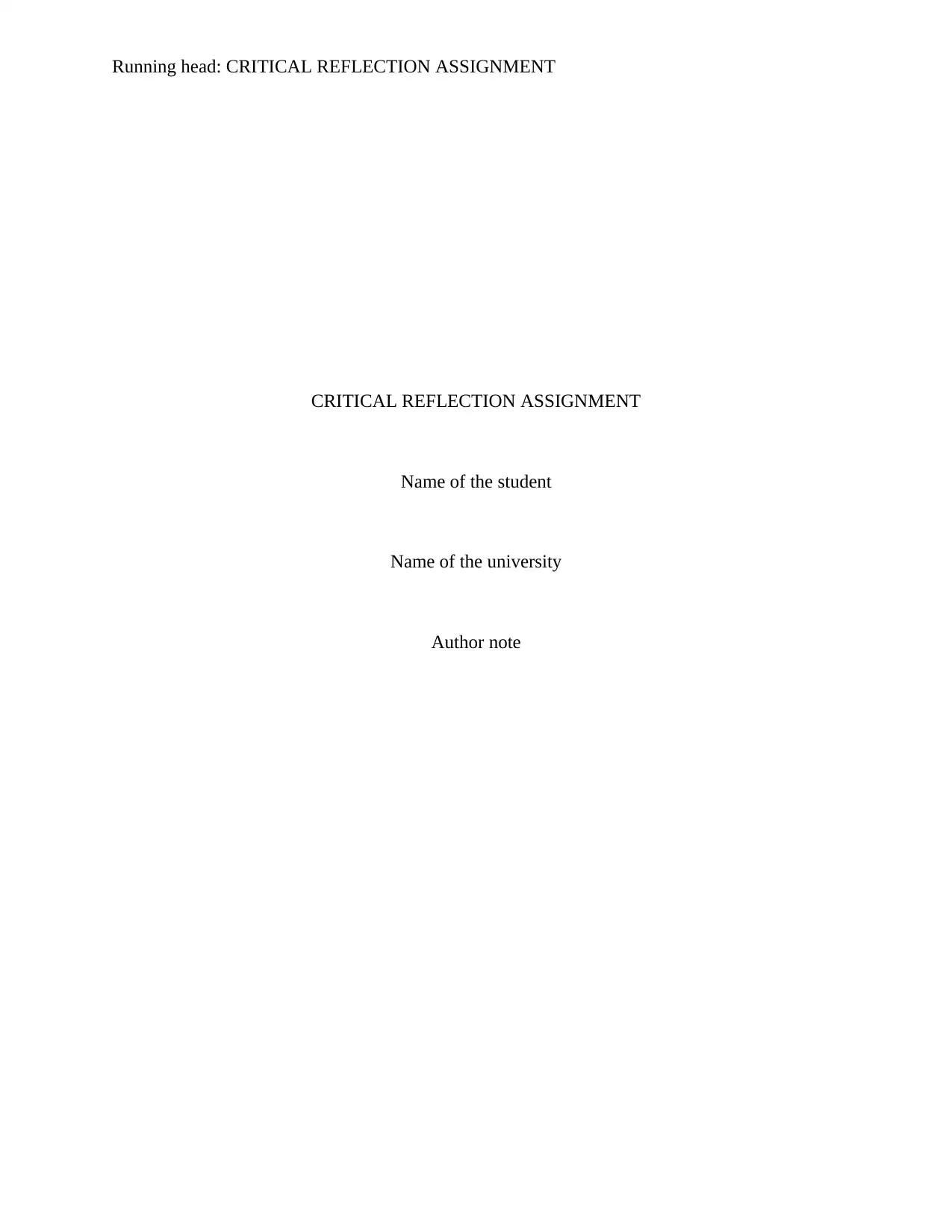
Running head: CRITICAL REFLECTION ASSIGNMENT
CRITICAL REFLECTION ASSIGNMENT
Name of the student
Name of the university
Author note
CRITICAL REFLECTION ASSIGNMENT
Name of the student
Name of the university
Author note
Paraphrase This Document
Need a fresh take? Get an instant paraphrase of this document with our AI Paraphraser
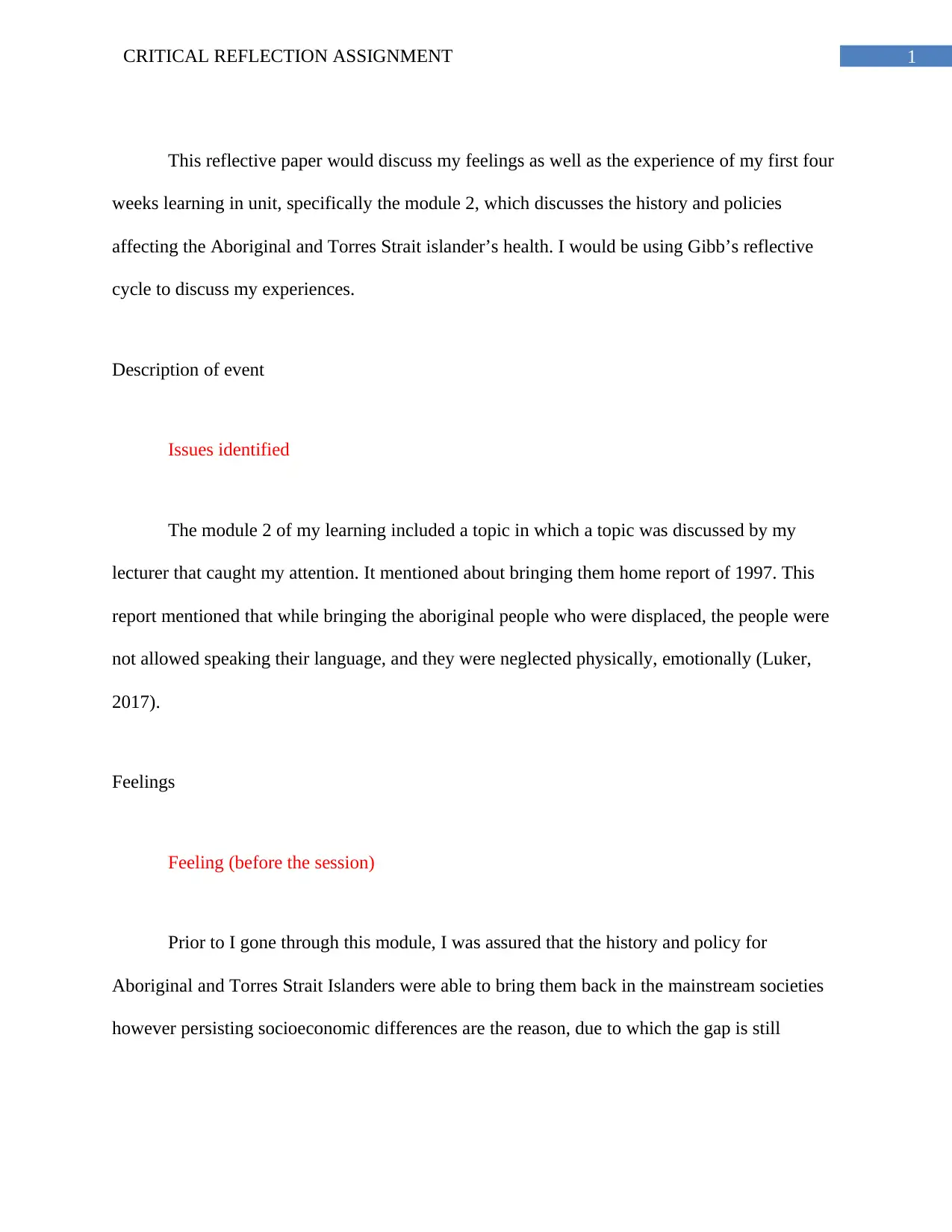
1CRITICAL REFLECTION ASSIGNMENT
This reflective paper would discuss my feelings as well as the experience of my first four
weeks learning in unit, specifically the module 2, which discusses the history and policies
affecting the Aboriginal and Torres Strait islander’s health. I would be using Gibb’s reflective
cycle to discuss my experiences.
Description of event
Issues identified
The module 2 of my learning included a topic in which a topic was discussed by my
lecturer that caught my attention. It mentioned about bringing them home report of 1997. This
report mentioned that while bringing the aboriginal people who were displaced, the people were
not allowed speaking their language, and they were neglected physically, emotionally (Luker,
2017).
Feelings
Feeling (before the session)
Prior to I gone through this module, I was assured that the history and policy for
Aboriginal and Torres Strait Islanders were able to bring them back in the mainstream societies
however persisting socioeconomic differences are the reason, due to which the gap is still
This reflective paper would discuss my feelings as well as the experience of my first four
weeks learning in unit, specifically the module 2, which discusses the history and policies
affecting the Aboriginal and Torres Strait islander’s health. I would be using Gibb’s reflective
cycle to discuss my experiences.
Description of event
Issues identified
The module 2 of my learning included a topic in which a topic was discussed by my
lecturer that caught my attention. It mentioned about bringing them home report of 1997. This
report mentioned that while bringing the aboriginal people who were displaced, the people were
not allowed speaking their language, and they were neglected physically, emotionally (Luker,
2017).
Feelings
Feeling (before the session)
Prior to I gone through this module, I was assured that the history and policy for
Aboriginal and Torres Strait Islanders were able to bring them back in the mainstream societies
however persisting socioeconomic differences are the reason, due to which the gap is still
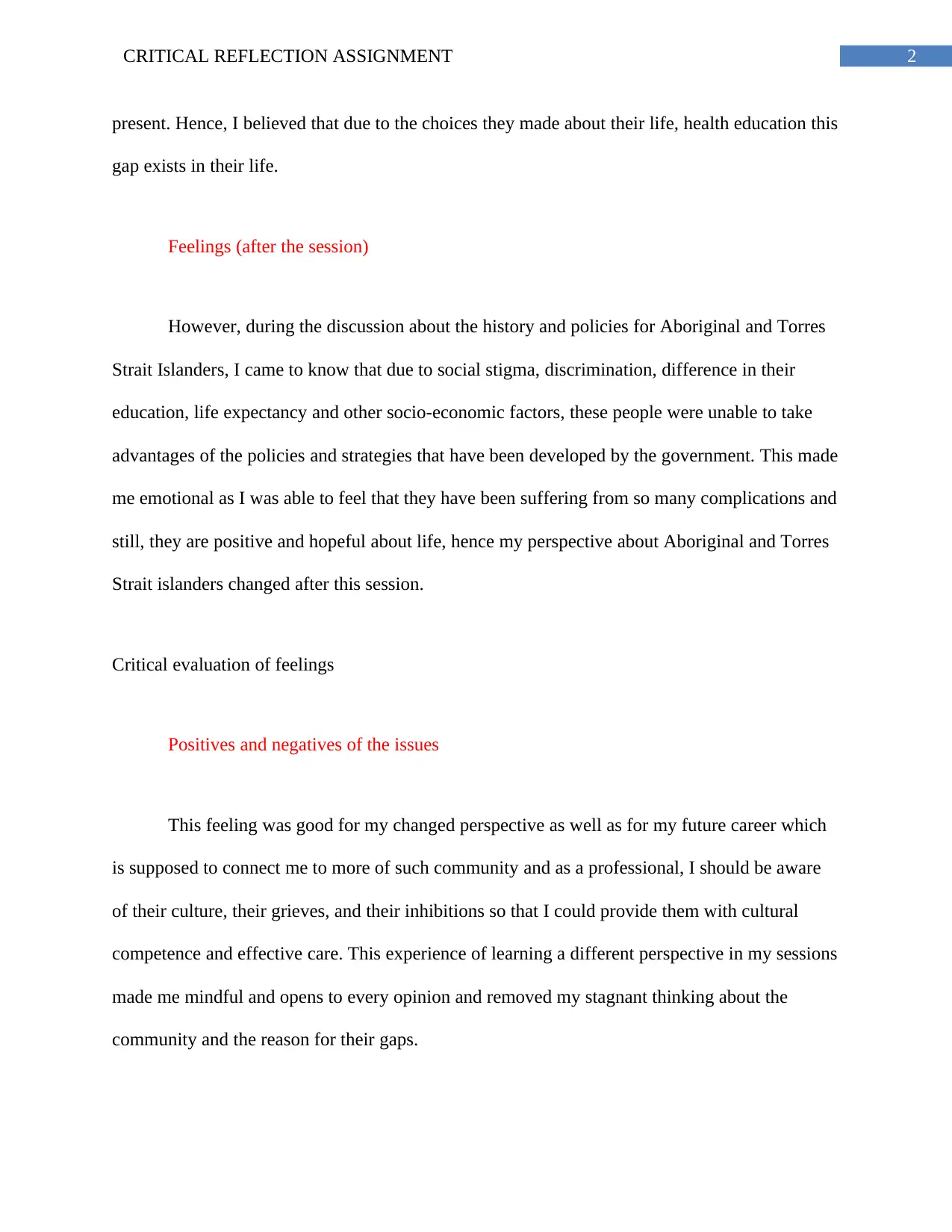
2CRITICAL REFLECTION ASSIGNMENT
present. Hence, I believed that due to the choices they made about their life, health education this
gap exists in their life.
Feelings (after the session)
However, during the discussion about the history and policies for Aboriginal and Torres
Strait Islanders, I came to know that due to social stigma, discrimination, difference in their
education, life expectancy and other socio-economic factors, these people were unable to take
advantages of the policies and strategies that have been developed by the government. This made
me emotional as I was able to feel that they have been suffering from so many complications and
still, they are positive and hopeful about life, hence my perspective about Aboriginal and Torres
Strait islanders changed after this session.
Critical evaluation of feelings
Positives and negatives of the issues
This feeling was good for my changed perspective as well as for my future career which
is supposed to connect me to more of such community and as a professional, I should be aware
of their culture, their grieves, and their inhibitions so that I could provide them with cultural
competence and effective care. This experience of learning a different perspective in my sessions
made me mindful and opens to every opinion and removed my stagnant thinking about the
community and the reason for their gaps.
present. Hence, I believed that due to the choices they made about their life, health education this
gap exists in their life.
Feelings (after the session)
However, during the discussion about the history and policies for Aboriginal and Torres
Strait Islanders, I came to know that due to social stigma, discrimination, difference in their
education, life expectancy and other socio-economic factors, these people were unable to take
advantages of the policies and strategies that have been developed by the government. This made
me emotional as I was able to feel that they have been suffering from so many complications and
still, they are positive and hopeful about life, hence my perspective about Aboriginal and Torres
Strait islanders changed after this session.
Critical evaluation of feelings
Positives and negatives of the issues
This feeling was good for my changed perspective as well as for my future career which
is supposed to connect me to more of such community and as a professional, I should be aware
of their culture, their grieves, and their inhibitions so that I could provide them with cultural
competence and effective care. This experience of learning a different perspective in my sessions
made me mindful and opens to every opinion and removed my stagnant thinking about the
community and the reason for their gaps.
⊘ This is a preview!⊘
Do you want full access?
Subscribe today to unlock all pages.

Trusted by 1+ million students worldwide
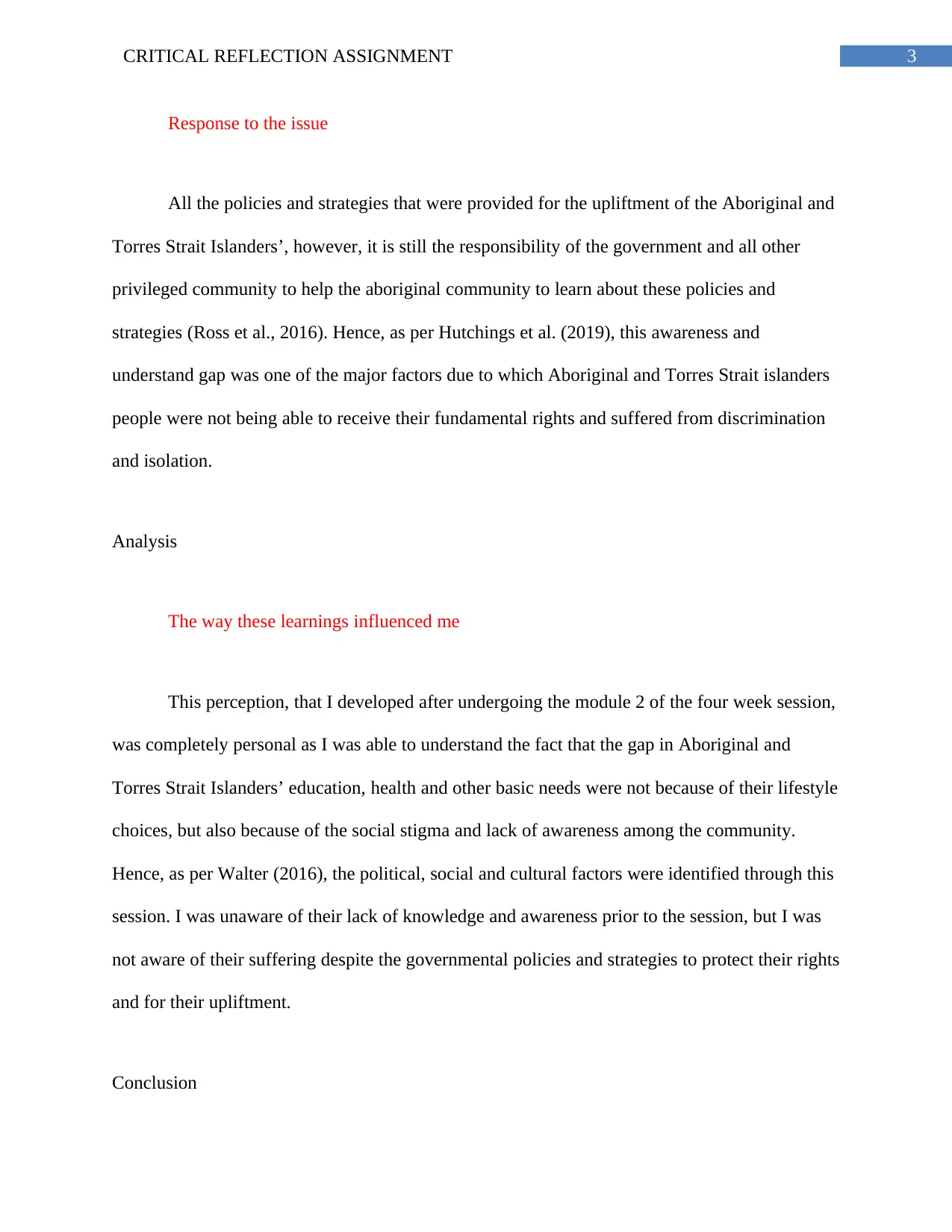
3CRITICAL REFLECTION ASSIGNMENT
Response to the issue
All the policies and strategies that were provided for the upliftment of the Aboriginal and
Torres Strait Islanders’, however, it is still the responsibility of the government and all other
privileged community to help the aboriginal community to learn about these policies and
strategies (Ross et al., 2016). Hence, as per Hutchings et al. (2019), this awareness and
understand gap was one of the major factors due to which Aboriginal and Torres Strait islanders
people were not being able to receive their fundamental rights and suffered from discrimination
and isolation.
Analysis
The way these learnings influenced me
This perception, that I developed after undergoing the module 2 of the four week session,
was completely personal as I was able to understand the fact that the gap in Aboriginal and
Torres Strait Islanders’ education, health and other basic needs were not because of their lifestyle
choices, but also because of the social stigma and lack of awareness among the community.
Hence, as per Walter (2016), the political, social and cultural factors were identified through this
session. I was unaware of their lack of knowledge and awareness prior to the session, but I was
not aware of their suffering despite the governmental policies and strategies to protect their rights
and for their upliftment.
Conclusion
Response to the issue
All the policies and strategies that were provided for the upliftment of the Aboriginal and
Torres Strait Islanders’, however, it is still the responsibility of the government and all other
privileged community to help the aboriginal community to learn about these policies and
strategies (Ross et al., 2016). Hence, as per Hutchings et al. (2019), this awareness and
understand gap was one of the major factors due to which Aboriginal and Torres Strait islanders
people were not being able to receive their fundamental rights and suffered from discrimination
and isolation.
Analysis
The way these learnings influenced me
This perception, that I developed after undergoing the module 2 of the four week session,
was completely personal as I was able to understand the fact that the gap in Aboriginal and
Torres Strait Islanders’ education, health and other basic needs were not because of their lifestyle
choices, but also because of the social stigma and lack of awareness among the community.
Hence, as per Walter (2016), the political, social and cultural factors were identified through this
session. I was unaware of their lack of knowledge and awareness prior to the session, but I was
not aware of their suffering despite the governmental policies and strategies to protect their rights
and for their upliftment.
Conclusion
Paraphrase This Document
Need a fresh take? Get an instant paraphrase of this document with our AI Paraphraser
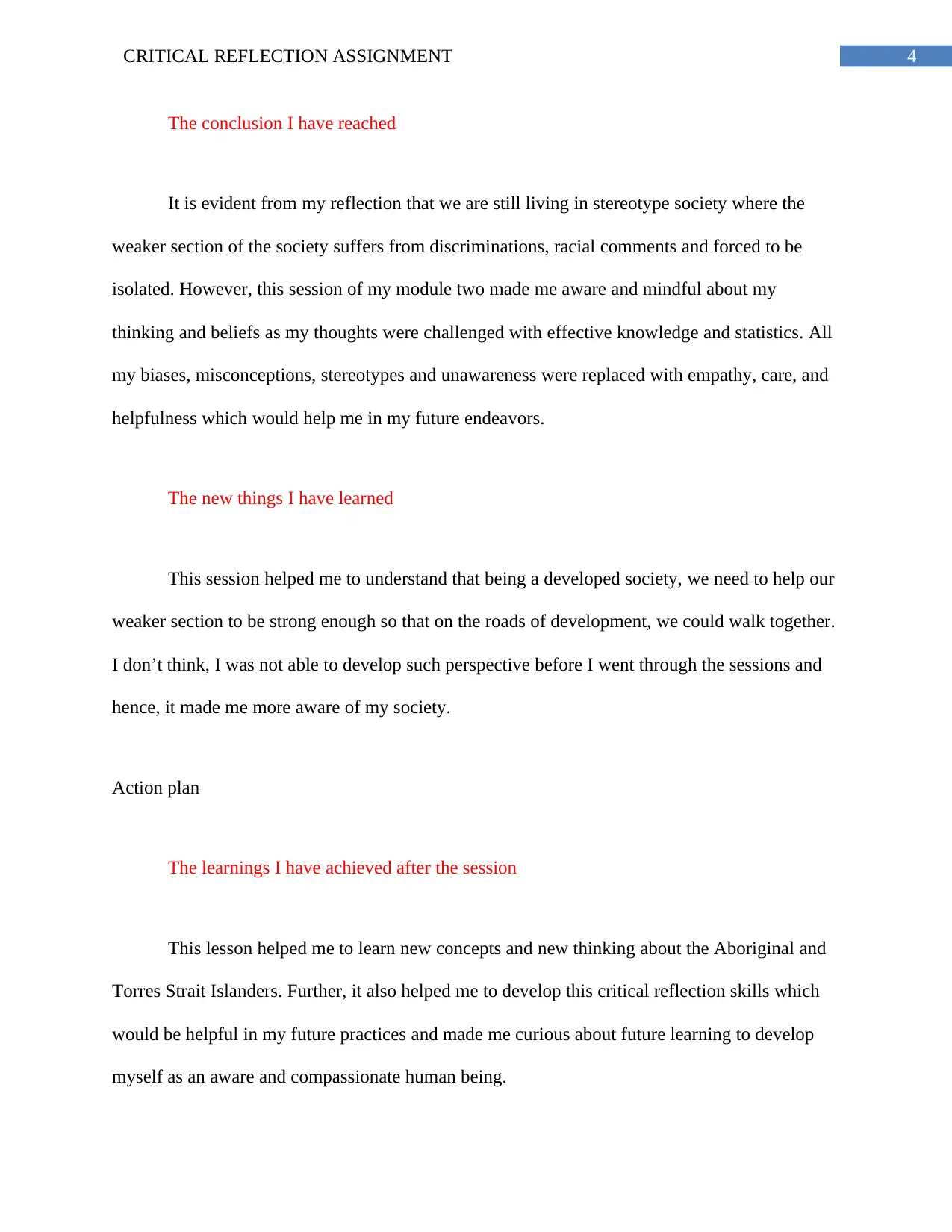
4CRITICAL REFLECTION ASSIGNMENT
The conclusion I have reached
It is evident from my reflection that we are still living in stereotype society where the
weaker section of the society suffers from discriminations, racial comments and forced to be
isolated. However, this session of my module two made me aware and mindful about my
thinking and beliefs as my thoughts were challenged with effective knowledge and statistics. All
my biases, misconceptions, stereotypes and unawareness were replaced with empathy, care, and
helpfulness which would help me in my future endeavors.
The new things I have learned
This session helped me to understand that being a developed society, we need to help our
weaker section to be strong enough so that on the roads of development, we could walk together.
I don’t think, I was not able to develop such perspective before I went through the sessions and
hence, it made me more aware of my society.
Action plan
The learnings I have achieved after the session
This lesson helped me to learn new concepts and new thinking about the Aboriginal and
Torres Strait Islanders. Further, it also helped me to develop this critical reflection skills which
would be helpful in my future practices and made me curious about future learning to develop
myself as an aware and compassionate human being.
The conclusion I have reached
It is evident from my reflection that we are still living in stereotype society where the
weaker section of the society suffers from discriminations, racial comments and forced to be
isolated. However, this session of my module two made me aware and mindful about my
thinking and beliefs as my thoughts were challenged with effective knowledge and statistics. All
my biases, misconceptions, stereotypes and unawareness were replaced with empathy, care, and
helpfulness which would help me in my future endeavors.
The new things I have learned
This session helped me to understand that being a developed society, we need to help our
weaker section to be strong enough so that on the roads of development, we could walk together.
I don’t think, I was not able to develop such perspective before I went through the sessions and
hence, it made me more aware of my society.
Action plan
The learnings I have achieved after the session
This lesson helped me to learn new concepts and new thinking about the Aboriginal and
Torres Strait Islanders. Further, it also helped me to develop this critical reflection skills which
would be helpful in my future practices and made me curious about future learning to develop
myself as an aware and compassionate human being.
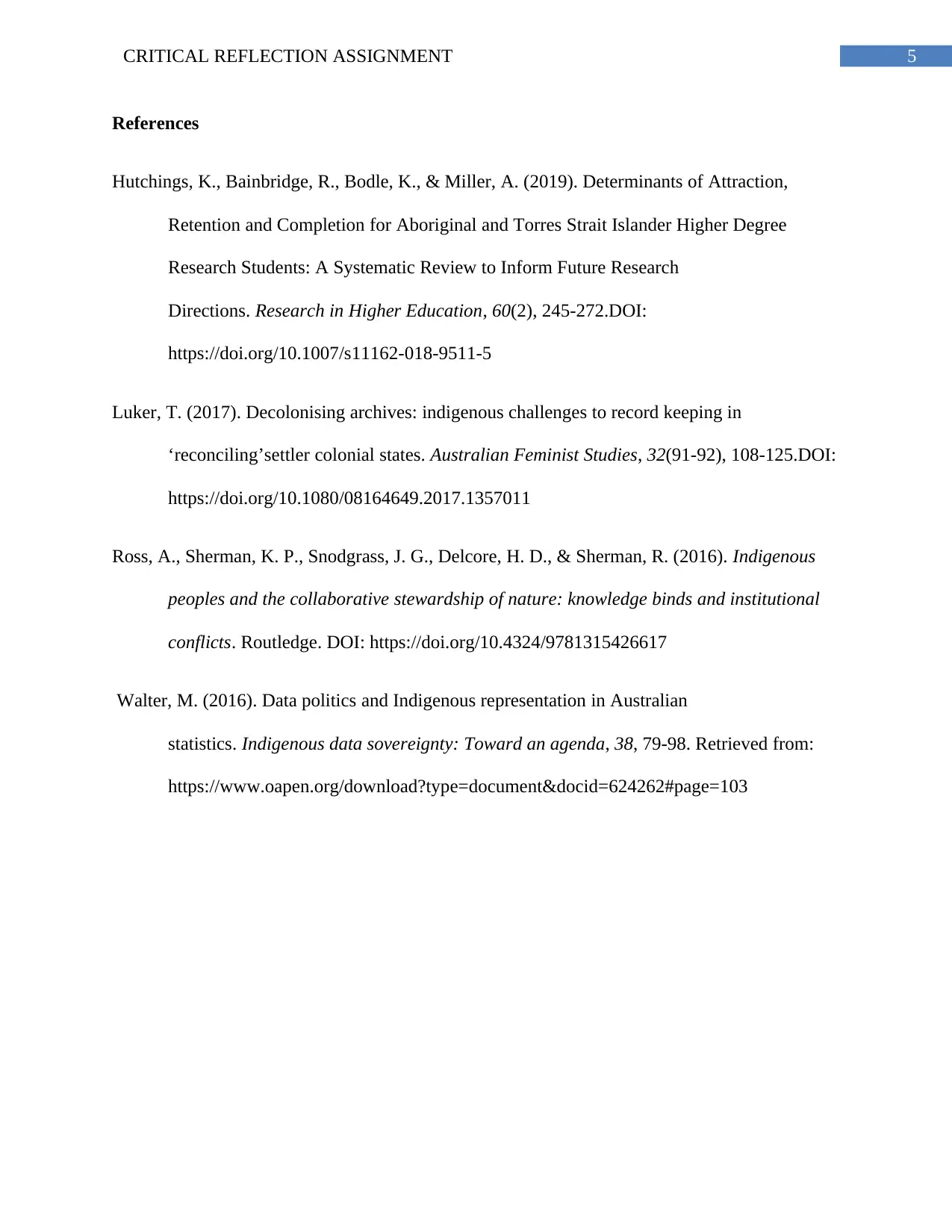
5CRITICAL REFLECTION ASSIGNMENT
References
Hutchings, K., Bainbridge, R., Bodle, K., & Miller, A. (2019). Determinants of Attraction,
Retention and Completion for Aboriginal and Torres Strait Islander Higher Degree
Research Students: A Systematic Review to Inform Future Research
Directions. Research in Higher Education, 60(2), 245-272.DOI:
https://doi.org/10.1007/s11162-018-9511-5
Luker, T. (2017). Decolonising archives: indigenous challenges to record keeping in
‘reconciling’settler colonial states. Australian Feminist Studies, 32(91-92), 108-125.DOI:
https://doi.org/10.1080/08164649.2017.1357011
Ross, A., Sherman, K. P., Snodgrass, J. G., Delcore, H. D., & Sherman, R. (2016). Indigenous
peoples and the collaborative stewardship of nature: knowledge binds and institutional
conflicts. Routledge. DOI: https://doi.org/10.4324/9781315426617
Walter, M. (2016). Data politics and Indigenous representation in Australian
statistics. Indigenous data sovereignty: Toward an agenda, 38, 79-98. Retrieved from:
https://www.oapen.org/download?type=document&docid=624262#page=103
References
Hutchings, K., Bainbridge, R., Bodle, K., & Miller, A. (2019). Determinants of Attraction,
Retention and Completion for Aboriginal and Torres Strait Islander Higher Degree
Research Students: A Systematic Review to Inform Future Research
Directions. Research in Higher Education, 60(2), 245-272.DOI:
https://doi.org/10.1007/s11162-018-9511-5
Luker, T. (2017). Decolonising archives: indigenous challenges to record keeping in
‘reconciling’settler colonial states. Australian Feminist Studies, 32(91-92), 108-125.DOI:
https://doi.org/10.1080/08164649.2017.1357011
Ross, A., Sherman, K. P., Snodgrass, J. G., Delcore, H. D., & Sherman, R. (2016). Indigenous
peoples and the collaborative stewardship of nature: knowledge binds and institutional
conflicts. Routledge. DOI: https://doi.org/10.4324/9781315426617
Walter, M. (2016). Data politics and Indigenous representation in Australian
statistics. Indigenous data sovereignty: Toward an agenda, 38, 79-98. Retrieved from:
https://www.oapen.org/download?type=document&docid=624262#page=103
⊘ This is a preview!⊘
Do you want full access?
Subscribe today to unlock all pages.

Trusted by 1+ million students worldwide
1 out of 6
Related Documents
Your All-in-One AI-Powered Toolkit for Academic Success.
+13062052269
info@desklib.com
Available 24*7 on WhatsApp / Email
![[object Object]](/_next/static/media/star-bottom.7253800d.svg)
Unlock your academic potential
Copyright © 2020–2026 A2Z Services. All Rights Reserved. Developed and managed by ZUCOL.





